
March 12, 2016

Lycabettus Hill, Athens
Source: Bigstock
Athens—I am walking around downtown Athens watching thousands of migrants fielding pitches from smugglers for alternative routes to Germany and Austria. I ask a friendly policeman fifty years younger than me why he doesn’t arrest the smugglers and throw the key away. “Others will take their place quicker than we put the handcuffs on them,” he tells me. “And they pretend to be migrants the moment we approach.”
Smuggling people is big business, and most of the bad guys are Afghans, as far as I can tell while mixing among them. It is grim stuff, especially where children are concerned. Victoria Square is a tree-lined park where long ago my grandfather owned a large family house. The area is no longer chic, hence the influx of migrants and smugglers. Yet there are Good Samaritans handing out food despite the fact that Greece herself is the poorest country in the EU and is being squeezed daily by the hated troika.
I chat with a man called Vangelis who is handing out sweets and bread to migrants. I tell him that I’m Golden Dawn and what he’s doing is commendable. “Golden Dawn was good in keeping criminals in line in the past,” he says, “but these people here are victims, and that’s why I’m here.” “What about the people-smugglers?” I ask him. “They should be shot on the spot,” he tells me with a smile. The ones I feel very sorry for are the poor Greeks whose shops and fast-food joints are totally empty because of the migrants lining the streets in front of them.
The next day I’m back near the square but to the east of it, where migrant creep is taking place. What I notice is the relative wealth of many of them, paying shops in order to load their mobiles and buying food and drink. From what I can tell they are Afghans, Moroccans, and Pakistanis, not a Syrian among them. The latter are mostly with wives and children and are law-abiding. The former look aggressive, are mostly young, and seem demanding. The Port of Piraeus is where most of these non-refugees are concentrated, and I predict forced roundups sooner rather than later as they smell weakness on the part of the Greek government to crack down.
What strikes me is the dignity I notice among poor Greeks. One of them, an old man, is selling postcards for one euro but has no takers. Another is pitching some silk to three obese Cypriot women tourists who speak to him in guttural English. No sale. It is heartbreaking to watch, and I wish for some EU biggie to come around so I could strangle him. Merkel would do fine. Greek prime minister Tsipras would also fit the bill, but he’s busy meeting his kind behind the marble walls of his office next to the royal palace. He has overseen the sacrifice of the country to EU incompetence in order to remain in power, and to hell with the consequences. He could have prevented the catastrophe by dispatching three PT boats to patrol the straits that separate Greece and Turkey, but instead he bowed to the EU ukase to do nothing and play nice. Elected twice by the Greeks because he pledged to stand up to Brussels, he has now become the enabler of this mess, appearing nightly on the news talking bullshit.
I flew to Athens with some friends for Aleko Goulandris’ 89th birthday, and after cruising the capital I went to dinner with four friends, one of them our ex-ambassador to Berlin, the other the curator of the Athens Museum of Cycladic Art. After the afternoon’s depressing peregrinations, I got hog-whimpering drunk, as a member of the Soames clan once described the condition. The next day was more research under a blazing sun, then Aleko’s party. The Greek royal family was in full force, and I sat between our queen and Spain’s queen mother. Then the premier violinist of our time, Leonidas Kavakos, appeared. He played “Happy Birthday” for our host, then a brilliant sonata by Brahms, both sentimental and gay (in the old-fashioned meaning of the word) in three movements. Everyone was transfixed by his virtuosity and the near sanctity of the moment.
There we were, twenty-some-odd close friends celebrating my oldest friend’s birthday with a great artist having volunteered to come and play because of my host’s generosity in the past for the arts, especially classical music. Well into my cups, I was driven home by a Greek Member of Parliament who asked me why I drank as much as I do. I blamed it all on the migrant crisis and the way-to-the-left ruling gang. He laughed out loud. “They are a very bad bunch,” he said, “but they’re not responsible for your drinking.” I told him he was a pedant, thanked him, and bid him good night.